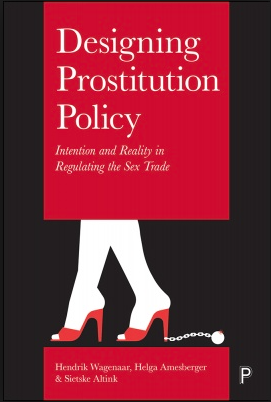It is no exaggeration to say that the ideological movement to eradicate prostitution from society is once again in the ascendency. In most European countries, as well as the USA, prohibitionism is now the dominant voice in the societal debate about prostitution. However, prohibitionism is a deeply misguided, and, in its implications, dangerous ideology which ignores the real gender problems in society and the structural exploitation of migrant workers in the low-end labor market.
The prohibitionist argument is familiar: sex workers are victims
The prohibitionist argument is familiar: sex workers are victims, if not of organised crime, then of the structural (sexual) subjugation that characterises a deeply patriarchal society. The large majority of women in prostitution are coerced; visiting a sex worker amounts to nothing less than rape. It offends every well-thinking citizen to see women display themselves and ‘sell their body’ to sex-addicted punters. Prostitution is simply offensive, and even one act of prostitution debases the whole of womankind.
Many subscribe to the morally attractive measure to criminalise the client. In this way demand will dry up and the sex market will fizzle out. A wide and expanding array of political forces subscribes to this ideological position: Christian-Democrats, the Christian and Evangelical right, radical feminists and, in many countries, Social Democrats and the hard Left.
Gender inequality and sexual harassment at the workplace are depressingly common in Western democracies, as the #MeToo and equal pay movements testify
At first blush these are compelling arguments. Gender inequality and sexual harassment at the workplace are depressingly common in Western democracies, as the #MeToo and equal pay movements testify. Yet, without diminishing these all too real problems, I argue that the prohibitionist ideologies are wrong on the facts and that their stance and tactics have disturbing implications that transcend the relatively limited domain of prostitution.
 First the facts. In our research on prostitution policy in Austria and the Netherlands we came to the startling conclusion that even the most elementary statistics – the number of sex workers in a particular location, the number of cases of trafficking – were more or less impossible to obtain. The mobility among sex workers was too high, and the definition of trafficking was too unclear to allow the collection of accurate and reliable numbers. A subsequent comparison of 22 European countries confirmed this conclusion; not a single country had anything resembling reliable data.
First the facts. In our research on prostitution policy in Austria and the Netherlands we came to the startling conclusion that even the most elementary statistics – the number of sex workers in a particular location, the number of cases of trafficking – were more or less impossible to obtain. The mobility among sex workers was too high, and the definition of trafficking was too unclear to allow the collection of accurate and reliable numbers. A subsequent comparison of 22 European countries confirmed this conclusion; not a single country had anything resembling reliable data.
Yet, this uncomfortable fact does not prevent pundits and politicians from confidently throwing around large, inflated, an in many cases fabricated numbers. Dutch politicians indignantly declare that large numbers of trafficked women occupy the windows of Amsterdam’s famous Red Light district. A former District Attorney in Amsterdam, now a high-ranking official with the national Public Prosecutor, repeatedly declares on television that trafficking is endemic in the Amsterdam Red Light district, and that she personally prosecuted over 300 cases, many with clear convictions.
The real number of cases of trafficking brought to court in the Netherlands is less than 300 annually and includes labor exploitation in all industries. The number of registered cases of trafficking in prostitution in the Amsterdam Red Light District over the last five years is …… 2.
The media play a particularly pernicious role in the construction of alternative facts by uncritically reporting every utterance of these officials. Endless repetition in combination with the authority of the office has created a parallel reality of crime and sexual exploitation that has taken over our inner cities. It is now left to lonely bloggers to ‘correct’ these numbers.
But even if the numbers are unavailable, one could still argue that the normative argument stands. Who can condone patriarchy and subjugation? Against such a self-evident normative intuition the facts are powerless, if not irrelevant.
The great pragmatist philosopher John Dewey said that to hold a belief is to be prepared to act in a certain way. Normative reason is therefore practical reasoning. Prohibitionists are well aware of this. Their normative position ends in a clear call to action: remove prostitution from society.
Normative positions, such as prohibitionism can, and should, be held up to the light of empirical evidence
But they want to have it both ways: a normative position that is self-evidently right and beyond argument, and a practical design to which that rightness is automatically imparted. This is not possible. There is no unassailable connection between a normative position and its real-world implications. Normative positions, such as prohibitionism can, and should, be held up to the light of empirical evidence.
In our research we concluded for example, that registration of sex workers is an ineffective policy instrument, that repressive policies tend to result in the erosion of the human rights of sex workers, that the implementation of prostitution policy tends to result in a regulatory drift towards more repression, and that labor exploitation at the the work site, not trafficking, is endemic. These are examples of empirical evidence that pose big problems for the coherence and good judgment of the prohibitionist position.
There is one more uncomfortable implication of the abolition campaign: the erosion of democracy
There is one more uncomfortable implication of the abolition campaign: the erosion of democracy. The spectacle of politicians and authorities ignoring the law, or calculatedly lying or denouncing opponents of prohibitionism before the camera, does not create confidence in their authority.
For example, although the Dutch Senate has twice rejected a new, more repressive, national prostitution law because its intention to register sex workers contravenes national and EU privacy regulation. Despite Dutch courts prohibiting registration, a number of cities stubbornly kept on registering sex workers and storing highly personal data. This is not only a breach of civil rights but also shows contempt for the rule of law.

Red Light district in Amsterdam
In this climate it is no wonder that the Dutch NGO Non Nobis recently called city hall the greatest threat to sex workers. Authorities’ stubborn refusal to listen to sex workers and their willingness to sacrifice the rights and workplace of this already stigmatised group as the collateral of trying to ban prostitution from society, makes one wonder which vulnerable or peripheral group is next: refugees, socialists, critical journalists?
Prohibitionism stubbornly refuses to see that there is a humane and effective alternative: decriminalisation
Prohibitionism stubbornly refuses to see that there is a humane and effective alternative: decriminalisation, in combination with the inclusion of a strong advocacy organisation in the design and implementation of public policy. In contrast to prohibitionism this is not a millenarian ideal, but a working, durable policy design. It can be observed in New Zealand, the only country where sex workers have the same rights as the rest of the working population, where they are treated with the respect that every worker deserves, and where sex workers are not a proxy for larger religious or feminist culture wars.
Hendrik Wagenaar is co-author and –editor of two recent studies on prostitution policy: Designing Prostitution Policy: Intention and Reality in the Sex Trade (with Helga Amesberger and Sietske Altink; Policy Press, 2017. Open Access), and Assessing Prostitution Policies in Europe (with Synnøve Jahnsen (Eds.) Routledge, 2017).




